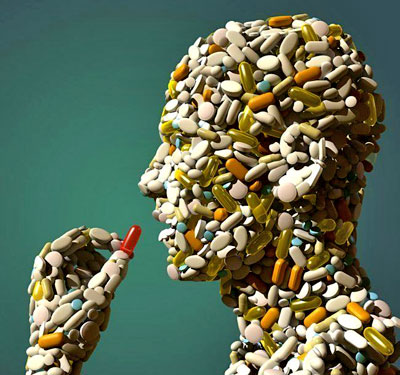|

by Karen De Coster
Contributor
February 18, 2012
from ActivistPost Website
|
Karen De Coster,
CPA is a libertarian accounting/finance professional and
freelance writer covering food freedom, regulatory
abuses and free market economics.
Visit her personal blog at KarenDeCoster.com |

The Pill Establishment has run out of
patience with people who are given prescription drugs and don't do a
good enough job of taking their pills as they are told.
Last year,
USA Today
reported that:
Americans may waste as much as $258 billion a year by not taking
prescribed medications because the missed doses lead to emergency
room visits, doctors' visits and in-patient hospitalizations,
according to a study by
Express Scripts, an independent
prescription-filling company.
..."Drugs don't work if you don't take them, and people often don't
take them the way they're supposed to," said Bob Nease, chief
scientist at Express Scripts.
If you read that right, yes, the study was performed by a a
prescription-filling company, or as we refer to them in the
healthcare industry, a Pharmacy Benefits Manager.
I'm sure the
results of the study couldn't possibly be skewed toward desired
results! Of course, these companies never look at the costs of loss
productivity, in-patient hospitalizations, benefit payouts, missed
work, hospital/emergency costs from overdoses, etc., due to the fact
that Americans are mainlining Big Pharma's profitable and "legal"
drugs.
The costs always seem to appear under the column heading,
"Costs of not taking drugs."
Here's another quote from the USA Today
story, and note carefully who says what:
People don't take their medications because they forget to refill
their prescriptions, forget to take them, feel they don't need them
or find them too expensive, said Edith Rosato, senior vice president
of pharmacy affairs for the National Association of Chain Drug
Stores.
An SVP (Senior Vice President) who pushes and lobbies for chain drug
stores claims that people aren't taking enough drugs. Folks, I am
not making this up. In fact, Express Scripts actually started
auto-enrolling their dependent drug slaves and gave them the choice
of opting out.
According to the article, here are the results of the
company's "legal" coercion:
Instead, they tried automatically enrolling patients for mail-order
prescriptions while telling them they could opt out. Few complained;
3% did opt out and the number of people receiving their
prescriptions through the mail increased from 15% to 79%.
Of course, these industry-funded studies never report on the costs,
let alone the deaths, of legalizing Big Pharma's coercive
drug-pushing.
In 2009, drugs exceeded the amount of traffic-related deaths,
killing at least 37,485 people nationwide. According to information
provided by the U.S. Centers for Disease Control and Prevention, the
very pharmaceuticals that are prescribed to treat life-endangering
conditions are now ending lives.
In September, 2011, ABC News
reported that:
Drugs now kill more people than motor vehicle accidents in the U.S.
-- a monumental shift that reflects gains in road safety amid a
troubling rise in
prescription drug abuse.
Drug overdoses and brain damage linked to long-term drug abuse
killed an estimated
37,485 people in 2009, the latest year for which
preliminary data are available, surpassing the toll of traffic
accidents by 1,201.
And the number is likely to rise as the U.S.
Centers for Disease Control and Prevention prepares to release its
official statistics in December.
..."There has been a dramatic increase in use of prescription drugs
as physicians have become more liberal in prescribing them," said
Paulozzi, adding that the bulk of drug-related deaths stems from
accidental opioid painkiller overdoses."
In response, government agents - otherwise known as elected
representatives acting in your interest - push legislation friendly
to the drug companies and their assorted offshoots of pharmaceutical
wonder.
In spite of the fact that prescription drug deaths are now
at an all-time high, the pill pushers and their legalized drug
runners in the medical establishment may have found a new way to
keep you in a pharmaceutical coma that benefits the bottom lines of
the mega-drug industry:
an Orwellian, wireless implant device that
will automatically feed you drugs that you neglect to take.
A thumbnail-sized microchip containing multiple drug reservoirs has
now passed clinical trials in which a wireless signal was used to
release precise daily doses, instead of requiring patients to inject
themselves with the drug.
The technology could help patients who
require frequent or daily injections.
Studies have shown that many medical patients do not take their meds
on schedule, especially when they are feeling good and think they no
longer need them. Unfortunately, many drugs today need to be taken
regularly and in precise doses in order to maintain their long-term
therapeutic effect.
As a result, many new technologies are being
tried that prompt the patient, via email or telephone reminders, to
administer the drug themselves.
The idea is that a physician will send a wireless signal to a
microchip implant (that stores drugs) that will allow the drugs to
be automatically dispensed into one's body.
Of course, this will
require the services of a highly profitable middleman and agent of
coercion - a medical implant communication service - to perform the
drug dispensing duty. Follow the money.
A Professor from MIT, Robert
Langer, helped to develop the idea, and here's
a quote from him:
"You can deliver multiple drugs [using] remote control," said Langer.
"You could literally have a pharmacy on a chip."
|

